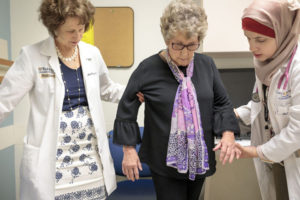The Center for Diabetes Translation Research interviews Dr. Miriam Jacome-Sosa, Assistant Professor of Medicine, for their Member Spotlight.
Q&A with Dr. Miriam Jacome-Sosa (Links to an external site)


The Center for Diabetes Translation Research interviews Dr. Miriam Jacome-Sosa, Assistant Professor of Medicine, for their Member Spotlight.

Obesity is a chronic disease affecting more than 40% of American adults. Losing even a little bit of excess weight can have very important clinical benefits, but knowing where to start can be challenging for many people. Washington University weight-loss specialist Samuel Klein, MD shares how the basics of your body’s energy balance – calories […]

Results are not that successful,” said Dr. Samuel Klein, director of the Center for Human Nutrition at the Washington University School of Medicine in St. Louis.

If your waist measures 35 or more inches as a woman or 40 or more inches as a man, you may have a dangerous amount of abdominal fat—also known as visceral fat.

Controlling for factors like body size and muscle mass, researchers found that there are basically four phases of metabolic rates, and that a slowdown in adults doesn’t occur until after age 60.

Rethinking medical care: Dr. Samuel Klein and collaborators seek to understand how and why some obese individuals are able to retain metabolic and cardiovascular health.

In the first clinical trial of nicotinamide mononucleotide, School of Medicine researchers have found that the compound previously demonstrated to counteract aspects of aging and improve metabolic health in mice also has clinically relevant effects in people.

Study finds that metabolic benefits of weight loss in severely obese people are the same whether they lose excess pounds through dieting or surgery.

Women recovering from hip fractures sought for multicenter study.

On WNYC’s The Takeaway, Samuel Klein, MD, director of the Center for Human Nutrition at Washington University School of Medicine in St. Louis, discusses the science of America’s obesity epidemic.